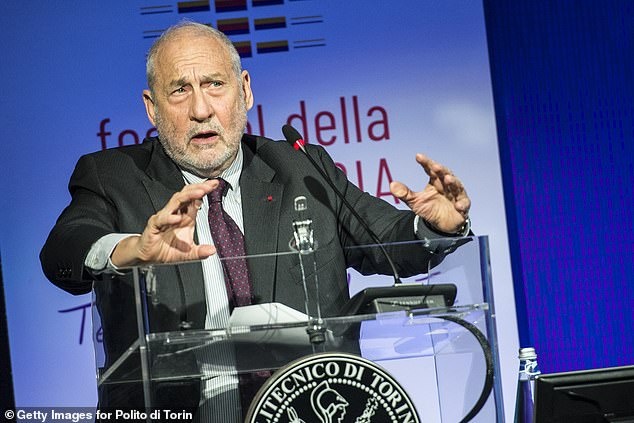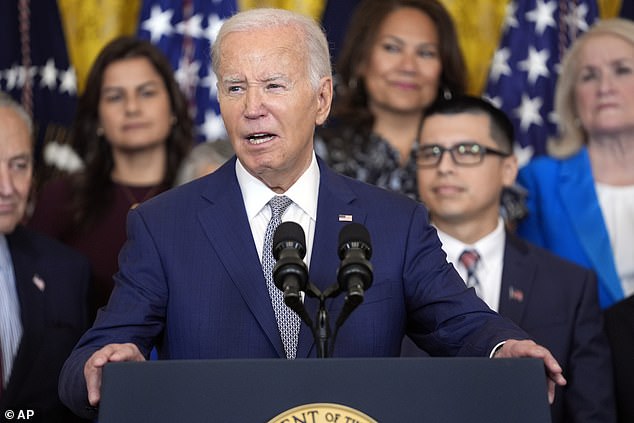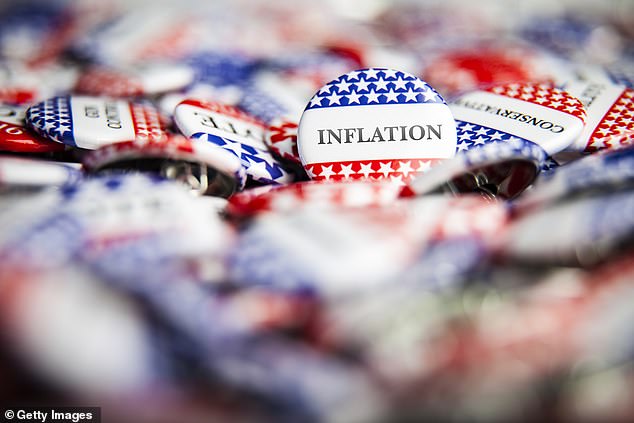Group of 16 Nobel prize-winning economists all agree which presidential candidate would be worst for inflation
A group of sixteen Nobel Prize-winning economists have issued a stark warning that inflation would be worse under Donald Trump.
The former president would reignite inflation and cause lasting damage to the US economy, the Nobel laureates said in a letter first obtained by Axios.
“While each of us has different views on the specifics of different economic policies, we all agree that Joe Biden’s economic agenda is vastly superior to Donald Trump’s,” the letter said.
The warning was spearheaded by American economist Joseph Stiglitz, who won the prestigious economics award in 2001.
Inflation remains a hot topic for voters ahead of November’s presidential election. Trump has long used criticism of so-called ‘Bidenomics’ to garner support.
A group of 16 Nobel Prize-winning economists has issued a stark warning that inflation will be worse under Donald Trump
The economists wrote: “We believe that a second Trump term would have a negative impact on the US economic position in the world, and a destabilizing effect on the US domestic economy.”
Many Americans are concerned about inflation, which has fallen remarkably quickly.
There are legitimate concerns that Donald Trump will reignite this inflation, with his fiscally irresponsible budgets,” they continued.
Annual inflation fell slightly in May to 3.3 percent, down from the previous month.
This is down from a 40-year high of 9.1 percent in June 2022, but still above the Federal Reserve’s 2 percent target.
Stiglitz was joined in his warning by fellow Nobel Laureates George A. Akerlof, Sir Angus Deaton, Claudia Goldin, Sir Oliver Hart, Eric S. Maskin, Daniel L. McFadden, Paul R. Milgrom, Roger B. Myerson, Edmund S. Phelps , Paul M. Romer, Alvin E. Roth, William F. Sharpe, Robert J. Shiller, Christopher A. Sims, and Robert B. Wilson.
Since prices spiked in 2022, the Biden administration has defended the economy.
The president is now keen to draw attention to former President Trump’s actual economic proposals, which are expected to be a major focus of the presidential debate later this week.
Trump’s main proposals include imposing a 10 percent tariff on all imports, a 60 percent tariff on Chinese imports, cutting corporate taxes and eliminating taxes on tips.
Biden, meanwhile, plans to raise taxes on corporations. He has also kept his promise not to increase levies on households earning less than $400,000, as families continue to feel the pressure of rising prices.
It comes after a shock report found Trump’s new trade war could cost middle-class families at least $1,700 a year.
Trump wants to reduce the US’s dependence on income taxes – and instead offset the deficit with higher import tariffs.
The former president has defended tariffs to help working Americans, but new research says the policy could hurt American workers and industries and worsen international relations.

The warning was spearheaded by American economist Joseph Stiglitz, who won the prestigious economics award in 2001

“We believe that a second Trump term would have a negative impact on the US economic position in the world, and a destabilizing effect on the US domestic economy,” the economists wrote in a letter.

Inflation remains a hot topic for voters ahead of November’s presidential election
Trump’s aggressive trade proposals would cost consumers at least $500 billion a year – or at least 1.8 percent of GDP – according to a paper published by the nonpartisan think tank the Peterson Institute for International Economics.
That’s five times the cost of the US-China trade war the former president started in 2018, it emerged.
Different analysis The presidential candidates’ budget spending released earlier this week showed that Trump has increased the national debt by almost twice as much as Biden did during his presidential term.
According to the independent public policy think tank the Committee for a Responsible Federal Budget, Trump has approved $8.4 trillion in new 10-year loans during his entire term.
Meanwhile, President Biden has greenlit $4.3 trillion in the same type of loans, with seven months to go.
Even excluding pandemic-era relief spending, Trump still contributed more to the national debt during his time in office, the report found.
The winner of November’s presidential election faces a bleak budget outlook, with public debt on track to reach a record share of the economy under the next administration.
The debt surpassed $34 trillion early this year and is expected to surpass $56 trillion by 2034, according to forecasts earlier this month.
The Social Security trust fund is also on track for depletion by 2033, when only 79 percent of planned benefits would be payable.
If Congress does not ensure that these programs have the resources to continue paying full benefits, it would mean millions of Americans would see their monthly benefits reduced.
